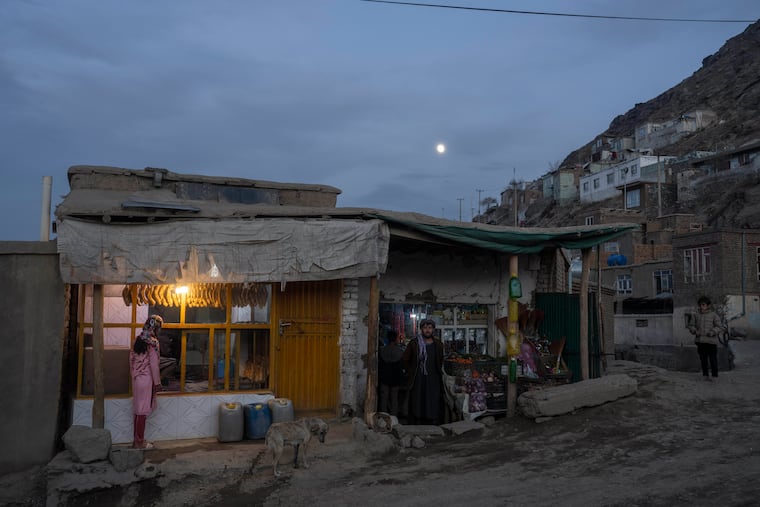Biden team needs to help the starving and the hunted in Afghanistan — now | Trudy Rubin
The U.S. should be enabling private charters to evacuate Afghans who helped our country and tweaking sanctions to avoid mass Afghan starvation this winter.

I got the call I’d been dreading at noon on Monday.
The Taliban had arrested N., an Afghan man whose family I’ve written about as they huddle in hiding. His family is in danger because several of them worked with Americans on anti-corruption and women’s rights issues before the U.S. withdrew troops from Afghanistan in August, leaving them behind.
Mercifully, N. was released, but only temporarily. (Because of fears for N.’s safety, I will only refer to him by the first initial of his given name.) The Taliban pledged to return; they have guards in front of their building. Terrified, with crying children and a severely ill grandmother, the family is waiting for the next knock on the door. Speaking to them on WhatsApp feels as if one were talking to Anne Frank as her safe house was being raided by the Nazis. In 2022, it’s possible to hear the terror live.
With war on the horizon if Russia attacks Ukraine, the Biden administration would prefer not to dwell on rescuing Afghans to whom America promised visas — those who worked with the U.S. military or with U.S. government agencies.
Nor has the administration focused sufficiently on preventing a massive humanitarian catastrophe in Afghanistan as the result of the U.S./NATO exit, a disaster that could also have refugee and security consequences.
» READ MORE: As U.S. tightens visa rules, thousands of Afghan allies at risk | Trudy Rubin
One U.S. humanitarian activist who is helping desperate Afghans told me: “We need an immediate solution for the starving and the hunted.” That solution can’t wait until the long-term crises with Russia and China calm down.
The Taliban have already made clear that they have not abandoned the repugnant behaviors they displayed during their previous rule in the late 1990s. Most women can no longer work, girls over 11 can’t attend public schools, and there are huge new barriers to health care for women.
Just last week I received grisly online photos of two Afghan female activists who were shot in a targeted Taliban assassination attempt in Laghman Province. Women’s rights leaders who haven’t been able to flee the country live in hiding. So do human rights lawyers, former prosecutors and judges, and on and on.
These high-risk cases, along with tens of thousands of Afghans who worked with the U.S. military and civilian officials, were promised evacuation. But the State Department failed to evacuate them before the U.S. exit and has closed the door to most who remain in hiding.
Worse, the State Department has refused clearance for many privately funded charters to take some of these folks out to safer countries — even though the manifests have been heavily vetted. Countries such as Kosovo and Albania want State Department assurance that evacuees from Afghanistan will eventually be allowed to enter the U.S. after more vetting. This is an assurance that the State Department won’t give.
So the hunted (who trusted U.S. promises) remain at the mercy of the Taliban hunters.
And then we come to the starving.
Prior to the U.S./NATO withdrawal, Afghanistan was heavily dependent on foreign aid, not just for the military but also for paying government workers and supporting education and health. The withdrawal of international aid, along with the freezing of billions of dollars of Afghan reserves held in the United States, have decimated the economy. Much of the male workforce is idle and women are confined to their homes. As a harsh winter approaches, aid groups estimate that around 60% of Afghans don’t have enough to eat.
Amanda Catanzano of the International Rescue Committee (IRC), which still has a large operation in Afghanistan, told me that there’s been progress in the amount of humanitarian funding, including from the U.S., but notes that “this crisis can’t be solved with humanitarian aid alone.”
That’s because well-deserved sanctions by Washington and the United Nations against the Taliban government have had the perverse effect of freezing the country’s central bank and financial system. This makes it impossible to pay government salaries (and the majority of remaining jobs are in the public sector).
Given the Taliban’s continued barbarity, it makes sense for the U.S. government to sanction them and their most heinous leaders by name. But there are potential workarounds to get cash into the Afghan government system — the IRC and others have lists of options— that wouldn’t involve de facto recognition. The money could also be directly channeled to pay ministry salaries and reopen banks.
» READ MORE: Don't abandon Afghan allies and the U.S. veterans who helped them | Trudy Rubin
U.S. wariness about dealing directly with the Taliban is justified until they stop terrorizing their own people and putting Al Qaeda allies into high government positions. But unless the Biden team deals with the roots of Afghanistan’s economic crash, the country’s remaining structures will collapse. That is much more likely to lead to renewed terrorist bases rather than the Taliban relinquishing military and political control.
Moreover, it is hypocritical to punish the Afghan people in the name of forcing the Taliban to respect human rights, when the United States refuses to rescue those close Afghan allies and activists who helped us.
There are potential options to aid the starving and the hunted people of Afghanistan, but the White House needs to act on them now.